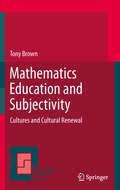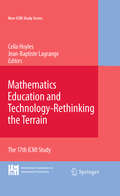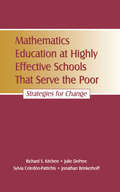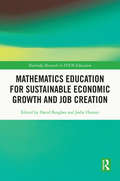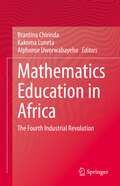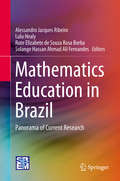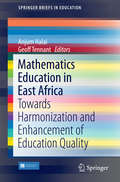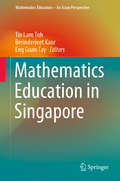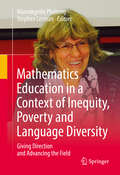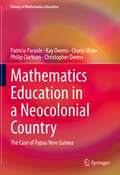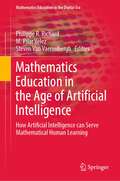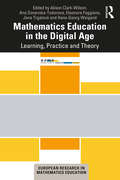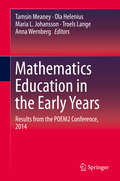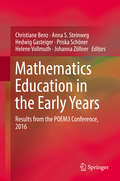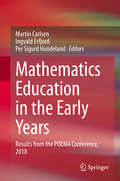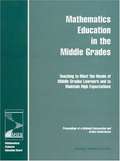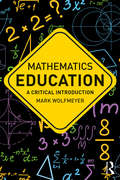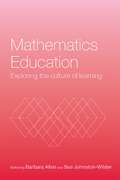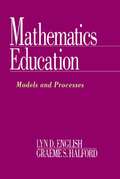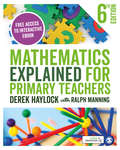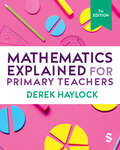- Table View
- List View
Mathematics Education and Subjectivity
by Tony BrownThis book is centrally concerned with how mathematics education is represented and how we understand mathematical teaching and learning with view to changing them. It considers teachers, students and researchers. It explores their mathematical thinking and the concepts that this thought produces. But also how these concepts acquire cultural layers that mediate our apprehension. The book examines some of the linguistic and socio-cultural filters that influence mathematical understanding. But above all it introduces some contemporary theories of human subjectivity, in which subjectivity is seen primarily as consequential to, rather than productive of, our attempts to represent or categorise the world in which we live. That is, our sense of who we are results from our attempts to see ourselves against the various versions of the world that we encounter. Such theories trouble the very notion of mathematical "concepts" as apprehended by "humans". And in foregrounding this concern with subjectivity the book considers mathematics rather differently to styles more familiar in many instances of mathematics education research. The book proposes that mathematics can provoke us to think differently about our world and as a result enable our transformative capacities. Such an orientation may disturb our understanding of what mathematics is, how it exists in an "objective" sense, insofar as mathematical objects can be derived from social filters being applied to the world, but also serve as filters on the world capable of producing new social entities.
Mathematics Education and Technology-Rethinking the Terrain
by Celia Hoyles Jean-Baptiste LagrangeMathematics Education and Technology-Rethinking the Terrain revisits the important 1985 ICMI Study on the influence of computers and informatics on mathematics and its teaching. The focus of this book, resulting from the seventeenth Study led by ICMI, is the use of digital technologies in mathematics teaching and learning in countries across the world. Specifically, it focuses on cultural diversity and how this diversity impinges on the use of digital technologies in mathematics teaching and learning. Within this focus, themes such as mathematics and mathematical practices; learning and assessing mathematics with and through digital technologies; teachers and teaching; design of learning environments and curricula; implementation of curricula and classroom practice; access, equity and socio-cultural issues; and connectivity and virtual networks for learning, serve to organize the study and bring it coherence. Providing a state-of-the-art view of the domain with regards to research, innovating practices and technological development, Mathematics Education and Technology-Rethinking the Terrain is of interest to researchers and all those interested in the role that digital technology plays in mathematics education.
Mathematics Education at Highly Effective Schools That Serve the Poor: Strategies for Change
by Jonathan Brinkerhoff Richard S. Kitchen Julie DePree Sylvia Celed¢n-PattichisThis book presents research findings about school-level and district-level practices and successful strategies employed in mathematics education by highly effective schools that serve high-poverty communities. It includes both the theory and practice of creating highly effective schools in these communities. In 2002 nine schools were selected in a national competition to participate in the Hewlett-Packard High Achieving Grant Initiative. As part of this Initiative, these schools participated in the research study this book reports. The study employed both qualitative and quantitative methodologies to examine school- and classroom-level factors that contributed to high achievement, particularly in mathematics. The goals of the study were twofold: 1) to investigate the salient characteristics of the highly effective schools in which the research was conducted, and 2) to explore participating teachers’ conceptions and practices about mathematics curriculum, instruction, and assessment. The schools described have much to teach about creating powerful learning environments that empower all students to learn challenging mathematics. Given the pressures of the accountability measures of the No Child Left Behind legislation, this book is extremely timely for those seeking school models that serve high-poverty communities and have demonstrated high performance on high-stakes examinations and other assessments. Mathematics Education at Highly Effective Schools That Serve the Poor: Strategies for Change is particularly relevant for teacher educators, researchers, teachers, and graduate students in the fields of mathematics education and school policy and reform, and for school administrators and district coordinators of mathematics education.
Mathematics Education for Sustainable Economic Growth and Job Creation (Routledge Research in STEM Education)
by David Burghes Jodie HunterMathematics Education for Sustainable Economic Growth and Job Creation considers the need for young employees to be capable and confident with transferable knowledge and skills in mathematics and statistics in order to support economic growth in developing countries in an increasingly digital age. This book draws on differing international perspectives in relation to mathematics education for sustainable economic growth and job creation. The contributors include education researchers and those involved in policymaking for both developing countries and beyond. Within each chapter, there is a reflection from the authors on their experiences in educational systems and policy development or research studies, which contribute to sustainable economic growth in different countries. As well as considerations of economies and job creation, the scholarship delves further into developing a critically aware citizenship through mathematics education. Extending current thinking about the role of mathematics education and educating students for future needs, this book will be of great interest for academics, researchers and postgraduate students in the field of mathematics education, STEM education and sustainability education.
Mathematics Education in Africa: The Fourth Industrial Revolution
by Kakoma Luneta Brantina Chirinda Alphonse UworwabayehoThis book is about mathematics teaching and learning in Africa during the Fourth Industrial Revolution. The Fourth Industrial Revolution (4IR) has evolved to utilize new technologies in the teaching and learning of Mathematics. It is characterized by the fusion of the biological, physical and digital worlds and embodies a new era of innovation in mathematics education, leading to the rapid emergence of new technologies for mathematics teaching and learning. Because 4IR in mathematics education is happening differently in various parts of Africa, the authors of the various chapters in this volume have positioned their work in their respective local contexts. The chapters address a wide variety of interests, concerns, and implications regarding 4IR and Mathematics Education in Africa. Additionally, a number of chapters address teaching mathematics in the context of the COVID-19 pandemic that has gripped the world. Other chapters discuss the implications of inequalities in Africa that effect mathematics education during 4IR. Chapters also incorporate arguments, observations, and suggestions to, improve and transform the teaching and learning of mathematics in Africa during the 4IR.This book highlights a new era of innovation in mathematics education in the context of the Fourth Industrial Revolution, leading to the rapid emergence of new technologies in mathematics teaching and learning. It is a valuable resource for graduate students, people with research interests in the fourth industrial revolution and mathematics educators at any level, including all mathematics teachers; mathematics education curriculum designers and policymakers.
Mathematics Education in Brazil: Panorama of Current Research
by Alessandro Jacques Ribeiro Lulu Healy Rute Elizabete Borba Solange Hassan FernandesThis book presents, for the first time in English, the state of the art of Mathematics Education research in Brazil, a country that has the strongest community in this field in Latin America. Edited by leading researchers in the area, the volume provides the international academic community a summary of the scientific production of the thirteen working groups of the Brazilian Society of Mathematics Education (SBEM), the national scientific society that brings together researchers, teachers, students and other professionals of the area. These working groups meet every three years at the International Seminar of Mathematics Education (SIPEM) and cover the following topics: Mathematics Education in the Early Years and Primary Education (Y1-Y5); Mathematics Education in the Middle School (Y6-Y9); Mathematics Education in the High School (Y10-Y12); Mathematics Education at the University level; History of Mathematics, Culture and Mathematics Education; Digital Technologies and Distance Education; Teacher Education; Assessment and Mathematics Education; Cognitive and Linguistic Processes in Mathematics Education; Mathematical Modeling; Philosophy of Mathematics Education, Teaching Probability and Statistics; and Difference, Inclusion and Mathematics Education. Each chapter of the book presents an overview of the production of a working group and they are all preceded by an introduction by professor Ubiratan D’Ambrosio, one of the pioneers of Mathematics Education in Brazil.
Mathematics Education in East Africa
by Anjum Halai Geoff TennantThis book is a valuable resource for policymakers andpractitioners as it brings insights mainly from developing countries whererelatively less research activity takes place. It is also a valuableresource for courses in mathematics education in the teacher education colleges,and departments of education in the sub-Saharan Africa region. In theincreasingly global and technological world mathematics is seen as asignificant gatekeeper of opportunities for social and economic advancement andmobility. Hence, countries and development agencies in the broader sub-SaharanAfrica region are looking towards increasing access to relevant andhigh-quality secondary education as a lever towards economic development. Policy makers and other key decision makers in education look towardsimprovement in mathematics teaching and learning as a key focus in educationreform. In the East Africa region also a number of initiatives have been takenat the national level in the respective countries to improve the quality ofmathematics education. This book provides an in-depth comparative analysisof the developments and issues in mathematics education in Kenya, Tanzania,Rwanda and Uganda, and advances our understanding of the state of secondarymathematics education in East Africa.
Mathematics Education in East Africa: Towards Harmonization and Enhancement of Education Quality (SpringerBriefs in Education)
by Anjum Halai Geoff TennantThis Open Access book is a valuable resource for policymakers and practitioners as it brings insights mainly from developing countries where relatively less research activity takes place. It is also a valuable resource for courses in mathematics education in the teacher education colleges, and departments of education in the sub-Saharan Africa region. In the increasingly global and technological world mathematics is seen as a significant gatekeeper of opportunities for social and economic advancement and mobility. Hence, countries and development agencies in the broader sub-Saharan Africa region are looking towards increasing access to relevant and high-quality secondary education as a lever towards economic development. Policy makers and other key decision makers in education look towards improvement in mathematics teaching and learning as a key focus in education reform. In the East Africa region also a number of initiatives have been taken at the national level in the respective countries to improve the quality of mathematics education. This book provides an in-depth comparative analysis of the developments and issues in mathematics education in Kenya, Tanzania, Rwanda and Uganda, and advances our understanding of the state of secondary mathematics education in East Africa.
Mathematics Education in Singapore (Mathematics Education – An Asian Perspective)
by Berinderjeet Kaur Tin Lam Toh Eng Guan TayThis book provides a one-stop resource for mathematics educators, policy makers and all who are interested in learning more about the why, what and how of mathematics education in Singapore. The content is organized according to three significant and closely interrelated components: the Singapore mathematics curriculum, mathematics teacher education and professional development, and learners in Singapore mathematics classrooms. Written by leading researchers with an intimate understanding of Singapore mathematics education, this up-to-date book reports the latest trends in Singapore mathematics classrooms, including mathematical modelling and problem solving in the real-world context.
Mathematics Education in a Context of Inequity, Poverty and Language Diversity
by Mamokgethi Phakeng Stephen LermanThis volume is dedicated to the career of Jill Adler and the role she has played in growing mathematics education research in South Africa, Africa and beyond. Her work epitomises what is referred to as the 'engaged scholar': i. e. doing rigorous and theoretically rich research at the cutting edge of international work in the field which at the same time contributes to critical areas of local and regional need in education. Jill is one of the world's leading experts in mathematics education research and her exemplary career is a continuous source of inspiration for generations of researchers and students. The chapters in this volume are authored by Jill's former PhD students, a few select colleagues from different parts of the world that she collaborated with as well as leading scholars who she worked with in PME, ICMI and in her many international assignments. In essence, this volume celebrates Jill's contribution not only to mathematics education but also to our contributions as her friends and colleagues. Topics covered include language and mathematics, teacher education, and the dilemma of an activist researcher engaging in issues that matter hugely to the participants in the research, students and teachers in post-apartheid schooling, whilst also setting up the separation that is needed for good research.
Mathematics Education in a Neocolonial Country: The Case of Papua New Guinea (History of Mathematics Education)
by Philip Clarkson Kay Owens Patricia Paraide Charly Muke Christopher OwensMost education research is undertaken in western developed countries. While some research from developing countries does make it into research journals from time to time, but these articles only emphasize the rarity of research in developing countries. The proposed book is unique in that it will cover education in Papua New Guinea over the millennia. Papua New Guinea’s multicultural society with relatively recent contact with Europe and the Middle East provides a cameo of the development of education in a country with both a colonial history and a coup-less transition to independence. Discussion will focus on specific areas of mathematics education that have been impacted by policies, research, circumstances and other influences, with particular emphasis on pressures on education in the last one and half centuries. This volume will be one of the few records of this kind in the education research literature as an in-depth record and critique of how school mathematics has been grown in Papua New Guinea from the late 1800s, and should be a useful addition to graduate programs mathematics education courses, history of mathematics, as well as the interdisciplinary fields of cross cultural studies, scholarship focusing on globalization and post / decolonialism, linguistics, educational administration and policy, technology education, teacher education, and gender studies.
Mathematics Education in the Age of Artificial Intelligence: How Artificial Intelligence can Serve Mathematical Human Learning (Mathematics Education in the Digital Era #17)
by Philippe R. Richard M. Pilar Vélez Steven Van VaerenberghThis book highlights the contribution of artificial intelligence for mathematics education. It provides concrete ideas supported by mathematical work obtained through dynamic international collaboration, and discusses the flourishing of new mathematics in the contemporary world from a sustainable development perspective. Over the past thirty years, artificial intelligence has gradually infiltrated all facets of society. When it is deployed in interaction with the human designer or user, AI certainly raises new ethical questions. But as soon as it aims to augment intelligence in a kind of human-machine partnership, it goes to the heart of knowledge development and the very performance of work. The proposed themes and the sections of the book address original issues relating to the creation of AI milieus to work on mathematics, to the AI-supported learning of mathematics and to the coordination of « usual » paper/pencil techniques and « new » AI-aided educational working spaces. The authors of the book and the coordinators of each section are all established specialists in mathematics didactics, mathematics and computer science. In summary, this book is a must-read for everyone interested in the teaching and learning of mathematics, and it concerns the interaction between the human and the machine in both directions. It contains ideas, questions and inspiration that invite to take up the challenge of Artificial Intelligence contributing to Mathematical Human Learning.
Mathematics Education in the Digital Age: Learning, Practice and Theory (European Research in Mathematics Education)
by Hans-Georg Weigand Alison Clark-Wilson Eleonora Faggiano Jana Trgalová Ana Donevska-TodorovaThe wide availability of digital educational resources for mathematics teaching and learning is indisputable, with some notable genres of technologies having evolved, such as graphing calculators, dynamic graphing, dynamic geometry and data visualization tools. But what does this mean for teachers of mathematics, and how do their roles evolve within this digital landscape? This essential book offers an international perspective to help bridge theory and practice, including coverage of networking theories, curriculum design, task implementation, online resources and assessment. Mathematics Education in the Digital Age details the impacts this digital age has, and will continue to have, on the parallel aspects of learning and teaching mathematics within formal education systems and settings. Written by a group of international authors, the chapters address the following themes: Mathematics teacher education and professional development Mathematics curriculum development and task design The assessment of mathematics Theoretical perspectives and methodologies/approaches for researching mathematics education in the digital age This book highlights not only the complex nature of the field, but also the advancements in theoretical and practical knowledge that is enabling the mathematics education community to continue to learn in this increasingly digital age. It is an essential read for all mathematics teacher educators and master teachers.
Mathematics Education in the Early Years
by Tamsin Meaney Ola Helenius Maria L. Johansson Troels Lange Anna WernbergThis book presents chapters based onpapers presented at the second POEM conference on early mathematics learning. Thesechapters broaden the discussion about mathematics education in early childhood,by exploring the debate about construction versus instruction. Specific sectionsinvestigate the teaching and learning of mathematical processes and mathematicalcontent, early childhood teacher development, transitions for young children betweenhome and preschool, between home and school and between preschool and school. Thechapters use a range of innovative theoretical and methodological approaches whichwill form an interesting basis for future research in this area.
Mathematics Education in the Early Years: Results From The Poem3 Conference 2016
by Christiane Benz Hedwig Gasteiger Anna S. Steinweg Priska Schöner Helene Vollmuth Johanna ZöllnerThis book gives insight in the vivid research area of early mathematics learning. The collection of selected papers mirror the research topics presented at the third POEM conference. Thematically, the volume reflects the importance of this relatively new field of research. Structurally, the book tries to guide the reader through a variety of research aims and issues and is split into four parts. The first two parts concentrate on teacher professional development and child learning development; the third part pools research studies creating and evaluating designed learning situations; and the fourth part bridges focuses on parent-child-interaction.
Mathematics Education in the Early Years: Results from the POEM4 Conference, 2018
by Martin Carlsen Ingvald Erfjord Per Sigurd HundelandThis book gives insights in the vivid research area of early mathematics learning. The collection of selected chapters mirrors the research topics presented at the fourth POEM conference in May 2018. Thematically, the volume reflects the importance of this evolving area of research, which has begun to attract attention in the spheres of education and public policy due to increased interest in early years learning. The research foci of the chapters comprise children’s mathematical reasoning, early years mathematics teaching, and the role of parents for children’s mathematical development. The 2018 conference included a wider range of researchers than previous years.
Mathematics Education in the Middle Grades: Teaching to Meet the Needs of Middle Grades Learners and to Maintain High Expectations
by National Research Council StaffIn September 1998, the Math Science Education Board held a Convocation on Middle Grades Mathematics that was co-sponsored by the National Council of Teachers of Mathematics, the National Middle School Association, and the American Educational Research Association. The Convocation was structured to present the teaching of middle school mathematics from two points of view: teaching mathematics with a focus on the subject matter content or teaching mathematics with a focus on the whole child and whole curriculum. This book discusses the challenges before the nation's mathematical sciences community to concentrate its energy on the improvement of middle grades mathematics education and to begin an ongoing national dialogue on middle grades mathematics education.
Mathematics Education: A Critical Introduction (Critical Introductions in Education)
by Mark WolfmeyerMathematics Education offers both undergraduates and starting-graduate students in education an introduction to the connections that exist between mathematics and a critical orientation to education. This primer shows how concepts like race, class, gender, and language have real effects in the mathematics classroom, and prepares current and future mathematics teachers with a more critical math education that increases accessibility for all students. By refocusing math learning towards the goals of democracy and social and environmental crises, the book also introduces readers to broader contemporary school policy and reform debates and struggles. Mark Wolfmeyer shows future and current teachers how critical mathematics education can be put into practice with concrete strategies and examples in both formal and informal educational settings. With opportunities for readers to engage in deeper discussion through suggested activities, Mathematics Education’s pedagogical features include: Study Questions for Teachers and Students Text Boxes with Examples of Critical Education in Practice Annotated List of Further Readings Glossary
Mathematics Education: Exploring the Culture of Learning
by Sue Johnston-Wilder Barbara AllenMathematics Education identifies some of the most significant issues in mathematics education today. Pulling together relevant articles from authors well-known in their fields of study, the book addresses topical issues such as: gender equity attitude teacher belief and knowledge community of practice autonomy and agency assessment technology. The subject is dealt with in three parts: culture of the mathematics classroom, communication in mathematics classrooms and pupils' and teachers' perceptions.Students on postgraduate courses in mathematics education will find this book a valuable resource. Students on BEd and PGCE courses will also find this a useful source of reference as will teachers of mathematics, mentors and advisers.
Mathematics Education: Models and Processes (International Perspectives On Mathematics Education Ser.)
by Lyn D. English Graeme S. HalfordTo define better techniques of mathematics education, this book combines a knowledge of cognitive science with mathematics curriculum theory and research. The concept of the human reasoning process has been changed fundamentally by cognitive science in the last two decades. The role of memory retrieval, domain-specific and domain-general skills, analogy, and mental models is better understood now than previously. The authors believe that cognitive science provides the most accurate account thus far of the actual processes that people use in mathematics and offers the best potential for genuine increases in efficiency. As such, they suggest that a cognitive science approach enables constructivist ideas to be analyzed and further developed in the search for greater understanding of children's mathematical learning. Not simply an application of cognitive science, however, this book provides a new perspective on mathematics education by examining the nature of mathematical concepts and processes, how and why they are taught, why certain approaches appear more effective than others, and how children might be assisted to become more mathematically powerful. The authors use recent theories of analogy and knowledge representation -- combined with research on teaching practice -- to find ways of helping children form links and correspondences between different concepts, so as to overcome problems associated with fragmented knowledge. In so doing, they have capitalized on new insights into the values and limitations of using concrete teaching aids which can be analyzed in terms of analogy theory. In addition to addressing the role of understanding, the authors have analyzed skill acquisition models in terms of their implications for the development of mathematical competence. They place strong emphasis on the development of students' mathematical reasoning and problem solving skills to promote flexible use of knowledge. The book further demonstrates how children have a number of general problem solving skills at their disposal which they can apply independently to the solution of novel problems, resulting in the enhancement of their mathematical knowledge.
Mathematics Explained for Primary Teachers
by Derek HaylockThis Fourth Edition of Derek Haylock's much loved textbook has been fully revised and restructured to match the current Attainment Targets for mathematics in England. Every chapter is written in a way that integrates children's learning, classroom practice and the teacher's own requirements for subject knowledge, making this the ideal text for primary PGCE courses. Features in the new edition include: two new chapters on mathematics in the primary curriculum and learning to learn mathematics more prominence given to using and applying mathematics sections matching the attainment targets for mathematics more learning and teaching points highlighted throughout the text further material on number, risk, use of ICT, graphs and data-handling. a research focus in every chapter. Additional online support The companion website provides a glossary and additional material to enable primary trainees to prepare with confidence for the ITT Numeracy test, and provides details of how each chapter of the book is linked to the National Curriculum. This will be updated to reflect any updates to the National Curriculum as they are introduced. You can also follow Derek Haylock's blog and Twitter feeds to discuss and share issues, news, policy and anything primary maths related! -Visit the companion website: www.uk.sagepub.com/haylock -Review Derek's blog: http://derek-haylock.blogspot.co.uk/ -Follow Derek on Twitter: https://twitter.com/derek_haylock Extensively used on primary PGCE courses and undergraduate courses leading to QTS, this bestselling book is an essential resource for all trainee primary teachers. A companion Student Workbook is also available, which: provides self-assessment activities for students to check their understanding of key concepts helps students to practise key mathematical processes and to apply mathematics in real-life situations gives opportunities to apply their knowledge to teaching and learning.
Mathematics Explained for Primary Teachers
by Derek Haylock Ralph ManningTo help teachers confidently teach mathematics in primary school, this book develops their understanding of mathematical concepts and processes and how children learn them. This sixth edition of Derek Haylock's popular book has been updated to highlight mastery approaches to teaching mathematics and how to apply these in the classroom. Every chapter integrates children's learning, classroom practice, and teacher subject knowledge, making this the ultimate primary mathematics resource for teacher training and beyond. Online resources accompanying the book include: An interactive ebook, carefully integrating video, activities and questions with book chapters Expanded and enhanced downloadable lesson plans for use in the classroom Revised solution videos taking readers through key concepts step-by-step Revised and reworked professional development tasks to extend teachers further
Mathematics Explained for Primary Teachers
by Derek Haylock Ralph ManningTo help teachers confidently teach mathematics in primary school, this book develops their understanding of mathematical concepts and processes and how children learn them. This sixth edition of Derek Haylock's popular book has been updated to highlight mastery approaches to teaching mathematics and how to apply these in the classroom. Every chapter integrates children's learning, classroom practice, and teacher subject knowledge, making this the ultimate primary mathematics resource for teacher training and beyond. Online resources accompanying the book include: An interactive ebook, carefully integrating video, activities and questions with book chapters Expanded and enhanced downloadable lesson plans for use in the classroom Revised solution videos taking readers through key concepts step-by-step Revised and reworked professional development tasks to extend teachers further
Mathematics Explained for Primary Teachers
by Derek HaylockBuild your confidence in the primary classroom Deepen your own mathematical subject knowledge Discover why generations of primary teachers have relied on Derek Haylock’s explanations of key mathematical concepts to support their understanding and strengthen their teaching This seventh edition has been fully updated to offer a broader exploration of mastery teaching, deeper connections to contemporary research and new coverage of how children learn to count. It is supported by a fantastic range of online resources including lesson plans, videos and test questions to extend your own learning.
Mathematics Explained for Primary Teachers
by Derek HaylockBuild your confidence in the primary classroom Deepen your own mathematical subject knowledge Discover why generations of primary teachers have relied on Derek Haylock’s explanations of key mathematical concepts to support their understanding and strengthen their teaching This seventh edition has been fully updated to offer a broader exploration of mastery teaching, deeper connections to contemporary research and new coverage of how children learn to count. It is supported by a fantastic range of online resources including lesson plans, videos and test questions to extend your own learning.
